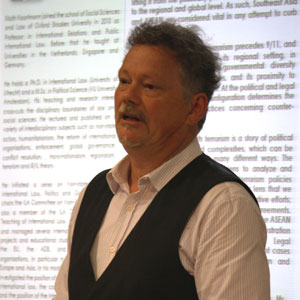Information
Venue
Start
End
15 September 2011 | CIL Seminar
Law and Politics of Counter-Terrorism in Southeast Asia: The ASEAN Approach
Introduction

Terrorism and counter-terrorism have definitely marked the first decade of the 21st century. The sheer increase in the number of terrorist attacks, and its perceived global societal and economic effect, forced states to reconsider and re-engage terrorism at the level of international and regional cooperation. After 9/11, terrorism has been constructed as one of the predominant global threats, lifting it from the politically preferred local/national level to the regional and global level. As such, Southeast Asia and ASEAN are considered vital in any attempt to curb today’s global terrorism.
ASEAN’s engagement with terrorism precedes 9/11, and is informed and shaped by its regional setting, in particular the religious and governmental diversity among ASEAN’s member states, and its proximity to India, Pakistan and Afghanistan. At the political and legal level, ASEAN’s institutional configuration determines the regional policies and practices concerning counter-terrorism.
ASEAN’s engagement with terrorism is a story of political and legal ambiguities and complexities, which can be interpreted and assessed in many different ways. The “ASEAN Way” offers a particular lens to analyze and evaluate Southeast ASEAN’s counter-terrorism policies and practices. It is through that particular lens that we have to capture and weigh ASEAN’s cooperative efforts; its ministerial meetings, declarations and agreements. The difficult ratification process and analysis of the ASEAN Convention on Counter-Terrorism serves as an illustration of ASEAN’s counter-terrorism problematic. Legal proceedings against terrorist suspects and recent cases underscore the delicate mix of multilateralism and unilateralism in the ASEAN context.
About the Speaker
Dr Math Noortmann joined the school of Social Sciences and Law of Oxford Brookes University in 2010 as Professor in International Relations and Public International Law. Before that he taught at Universities in the Netherlands, Singapore and Germany.
He holds a Ph.D. in International Law (University of Utrecht) and a M.Sc. in Political Science (VU University Amsterdam). His teaching and research interest cross-cuts the disciplinary boundaries of law and social sciences. He lectured and published on a variety of interdisciplinary subjects such as non-state actors, humanitarianism, the reform of international organizations, enforcement, global governance, conflict resolution, , trans-nationalism, regionalism, terrorism and IR/IL theory.
He initiated a series on Non-state Actors in International Law, Politics and Governance and chairs the ILA Committee on Non-State Actors. He is also a member of the ILA Committee on the Teaching of International Law. He has coordinated and managed several international environmental projects and educational studies for governments, the EU, the ADB, and non-governmental organizations, in particular in Central and Eastern Europe and Asia. In his most recent publications, he investigated the position of armed non-state actors in international law, the concept of transnationalism and the position of the International Law Association as an epistemic community.


